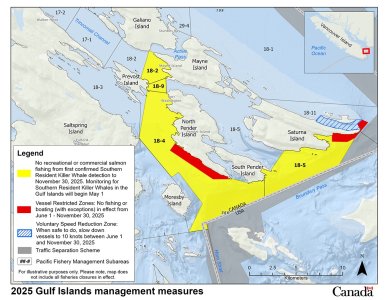Flounder_pounder
Active Member
I recieved an email today from Transport Canada's "Whale Enforcement Unit". Quite a nasty letter... I was going to attach it, then realize it's protected goverment information, so probably best not to. It's all quite official looking. We spend lots of time boating around the Southern Gulf Islands with the family... we have a printed map on board showing the whale zones, and we put effort into respecting them. The day in question, I was exploring a beach nearby the zone with my son, but not within it. I went to my boat this evening to review the trail left on my chart to make sure, and at one point we got very close, but we stayed out of the zone the entire time... I see big yachts/sailboats all the time brutally violating these zones.... Anyways. Just wanted to post it here to let ya'll know... they're watching you ... Good use of our tax dollers i'd say.
... Good use of our tax dollers i'd say.

Last edited:
